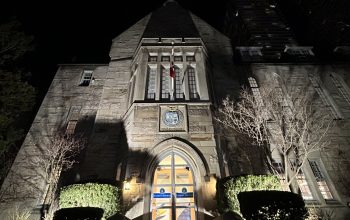Photo Credit: U of T Law School via Facebook
Independent review follows pressure and global backlash over allegations of external influences
Jennifer Zhong, Associate News Editor
Controversy over hiring process
Edward Iacobucci, current dean of the University of Toronto (U of T) Faculty of Law, has been accused of rescinding an offer for Valentina Azarova as the director of the International Human Rights Program (IHRP) at the U of T Faculty of Law. Allegations have surfaced claiming the offer was rescinded due to external influences. The university has refused to comment on the issue, citing confidentiality.
Azarova accepted the position in mid-August and was planning to move from Germany to Toronto before the offer was abruptly rescinded. Allegations have since surfaced that Justice David Spiro, a sitting judge on the Tax Court of Canada and a major donor to the faculty, has exerted inappropriate influence. Spiro has reportedly expressed concerns in private over Azarova’s past work on Israel’s human rights abuses in Palestine. Iacobocci has denied that the offer was made and denied that the offer was rescinded due to judicial interference, citing immigration issues as the reason.
Following the controversy, the entire IHRP faculty advisory board has resigned. International legal academics have individually written and published open letters demanding an investigation into the issue. Numerous organizations have questioned the university’s hiring practices, including the global human rights organization, Amnesty International, the Canadian Association of University Teachers (CAUT), and the National Council of Canadian Muslims (NCCM). Human Rights Watch has published an article on the issue, saying that, “it creates a dangerous chilling effect on other scholars’ rights to research and advocacy if true.”
Concerns over review
U of T has launched an inquiry into the hiring process of Valentina Azarova as the director for the International Human Rights Program at the Faculty of Law following mounting international pressure.
The review was announced a day after a letter written by nine members of the law faculty, calling into question the “extraordinary authority” of the dean, was made public.
The “independent review” will be conducted by Professor Bonnie Patterson, former president of the Council of Ontario Universities, and professor emeritus and former president of Trent University. The university expects it to be completed by mid-January, and the results to be submitted to the dean, the provost, and the head of human resources and equity. However, critics note that the process lacks transparency, effectiveness, and expressed concern over the conduct of those administrators.
“It’s hard to see it being an impartial review when these are the people you’re reporting to,” says David Robinson, executive director of the CAUT, to The Globe and Mail. In addition, the question of Azarova’s job offer and Spiro’s alleged interference are not specifically addressed in the terms.
Former director of the IHRP, Samer Muscati, questions Patterson’s role in the review, wondering why someone from outside the university system was not chosen. He also questions the transparency, asking why the report will be submitted to university administrators such as Kelly Hannah-Mofatt, who has already been implicated in the issue, rather than released publicly: “Ultimately this needs to be truly independent and released publicly—not to university administrators that are implicated”.




